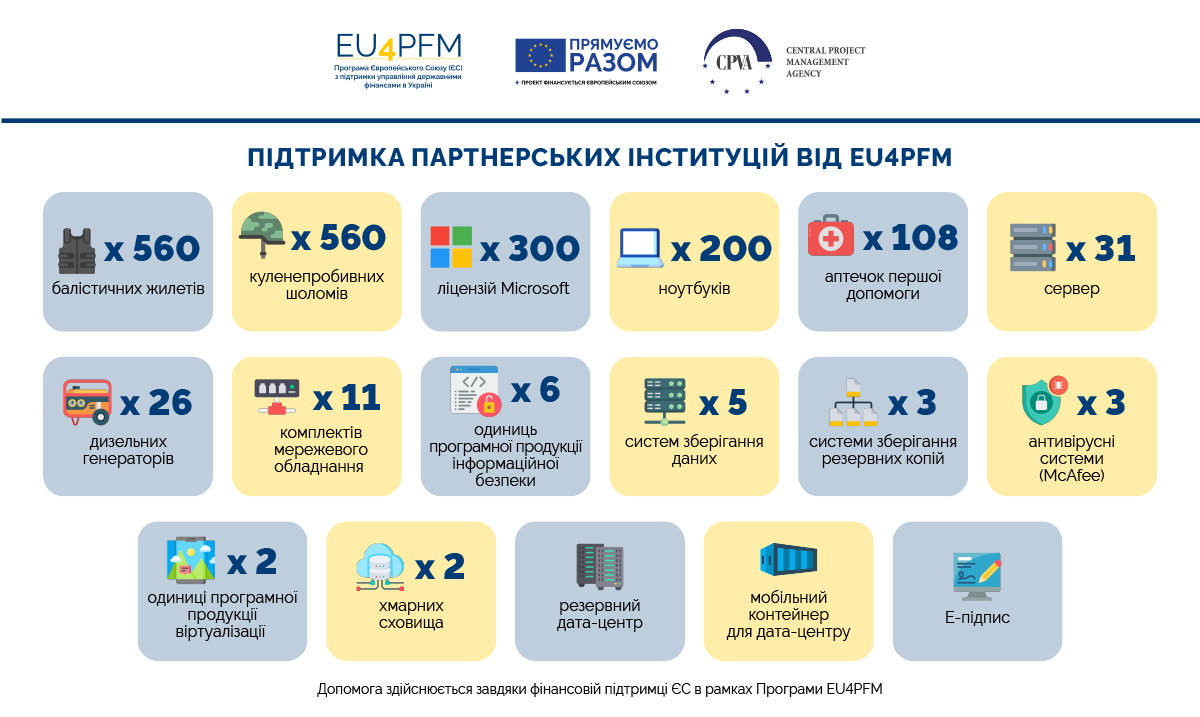Tackling Ukraine’s public finance management challenges in times of war
Since the beginning of full-scale Russia’s invasion, the EU has supported Ukraine tremendously, proving itself as a reliable ally who extends a helping hand in the direst circumstances. Macro-financial assistance, several sanctions packages against Russia, emergency aid, granted candidacy status for EU accession, an invite to the Convention on a Common Transit and the Convention on the simplification of formalities in trade in goods – the list of support actions could go on.

Team Leader
This shows that the EU considers Ukraine a real partner capable of strengthening the Union. Despite the ongoing hostilities, Ukraine continues its European integration course and implementation of reforms. And Ukrainians who bravely fight for their freedom and independence on the front line and work in diplomatic stands prove this fact daily. Their courage warrants our admiration.
Much has been said about the EU’s contribution to Ukraine’s victory over the aggressor. Therefore, I would prefer to focus on Ukraine’s achievements in public finance management as there are many.
For more than three years, the EU Public Finance Management Support Programme for Ukraine has been assisting the country in reforming the public finance management system, and neither lockdown nor war can stop these processes.
Of course, the EU4PFM project was not an exception – the Russian invasion considerably affected its operation. Most activities and contracts of the project under implementation in February, according to the work plan for 2022, were put on hold until April. For this reason, it was necessary to update the actual work plan, and with this new schedule, the activities of the project were resumed. As a result, a new fifth component of the project, emergency assistance, was made possible after the repurposing of the funds.
EU4PFM emergency assistance
Once the EU4PFM team got over the initial shock, we began intensive consultations with the Delegation of the European Union to Ukraine and the partner institutions. We were approached by the Ministry of Finance, the Tax Service, and the State Customs Service with a request to ensure the smooth operation of institutions by preserving their sensitive data and the safety of employees. Mostly it was about support in solutions for data centers, assistance for general infrastructure, and support with personal safety equipment. Thus, until April, all our focus was on emergency assistance to strengthen resilience and build capacities to respond to war-generated impacts.
The infographic summarizes all equipment procured by EU4PFM for partner institutions. Some of the mentioned aids are still on the way, while others are already successfully used by colleagues.

As I mentioned above, the project now continues to work on some of the so-called pre-war work plan activities. Despite the war, considerable progress has been made in the customs and tax areas.
Ukraine’s small accession to the EU
Currently, Ukraine is on the way to a small accession to the EU, i.e., joining a visa-free customs regime. Despite the ongoing war, Ukraine successfully passed Conformance testing. It demonstrated high technical readiness to join the European Convention on a Common Transit and the Convention on the simplification of formalities in trade in goods. Thus, the EU-CTC monitoring team concluded that Ukraine has successfully completed one year of national transit operations under the New Computerised Transit System and is ready to be invited to accede to the Conventions. Such a key decision is the result of the joint fruitful work of EU4PFM experts in cooperation with partners from the Ministry of Finance, the State Customs Service, the Reform Support Team at the Ministry of Finance, business associations, and partners from the General Directorate for Taxation and the Customs Union of the European Commission (DG TAXUD), who supported Ukraine at every stage of this complex process. As a result, Ukraine received legislation and procedures corresponding to the EU Customs Code.
The introduction of the joint transit procedure means that in transit with 35 countries of the Convention, Ukrainian customs will receive similar functions and become a full partner. Transit procedures will be simpler and more transparent for businesses engaged in international trade.
Ukrainian achievements towards European integration course in tax stream
In the tax field, we also continued to work on some of the activities which were started before the war (implementation of the Contact Centre for the State Tax Service, e-case management, and e-cash registers mobile applications) and initiated the implementation of activities related to national obligations (like SAF-T file for e-Audit and Single Tax Account tax block). Let’s look into more details on each of the mentioned initiatives.
I would start with the results. Together with our partner, the State Tax Service, we completed the elaboration of the IT solution on the SAF-T file (a unified standard for business accountants that is considered a part of the e-Audit initiative). Soon it would be published for testing by businesses. The e-Audit initiative is one of the important parts of the Ukraine Recovery Plan. This tool significantly reduces the costs of both State Tax services and business, improving the quality of services.
Besides, free-of-charge e-cash registers mobile applications for iOS and Web versions are developed, also Windows and Android version upgraded for business. These solutions simplify tax compliance and reduce administrative bargains for small and medium-sized entrepreneurs. Now, these products are also in the testing stage.
EU4PFM continues cooperation with the State Tax Service and relaunches STS Contact Centre. This means that STS will soon increase the number of possible consultations, provide more opportunities to receive information, and speed up the provision of consultations by implementing the best innovations and international practices in providing quality service.
Another initiative is launching an IT system to automate the processes of administrative review of taxpayers’ complaints and support of tax disputes in courts (e-case management). We also have started working on it in cooperation with the State Tax Service. The new IT system aims to optimize business processes, specifically, automate document management and information exchange, monitor compliance with deadlines, and generate statistical and analytical e-reports. This IT solution reduces tax officials’ time to receive and process any complaints or court documents.
And last but not least, we continue preparation to join the international network of OECD Automatic Exchange of Information Standard on financial accounts. The required legislation is already drafted and will be provided for public evaluation soon.
Preparation for full-fledged membership in the EU
Finally, the experts of the project assisted in filling the questionnaires for Ukraine’s accession to the EU, actively participated in the Working Groups for the development of the National Recovery Plan and had the opportunity to present their proposals in this format.
I cannot help but notice that the status of Candidate Country, granted at the end of June, was very much awaited from the project and partner institutions’ side and provoked us to think about further perspectives and activities towards EU membership.
To sum up, EU4PFM, as an EU Programme, daily expresses its continuous and uninterrupted support to Ukraine. Despite the destruction and enormous losses brought by Russia’s unprovoked and unjustified attack, we stay united with Ukraine. We are committed to providing support to our partners for their immediate needs, implementing important reforms in the sphere of public finance management, and, of course, will support the reconstruction of democratic Ukraine and its further path towards EU membership. There is still a long way ahead, but I am confident that united, we will win.
Jurgita Domeikiene
Team Leader

